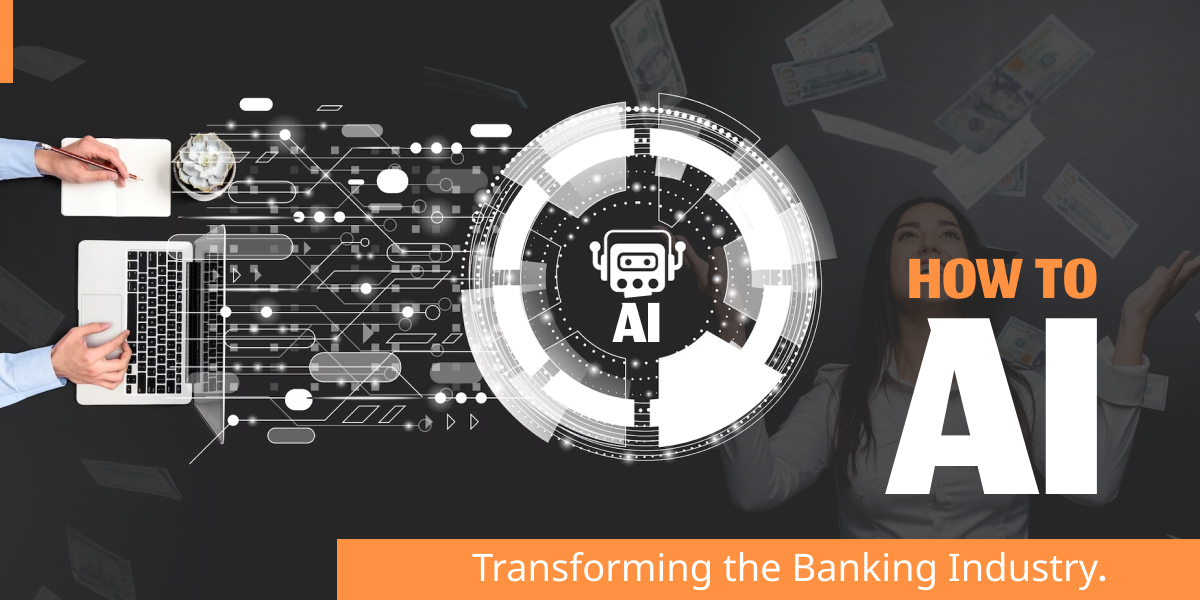- Gunjan Rajput
- Blogs
- 8th September 2023
How AI is transforming the Banking Industry
Artificial intelligence has made headlines in almost every industry including banking. Artificial intelligence in the banking sector has made high performing banks a reliably helpful and widely understood resource. The introduction of AI in banking apps and services has increased the industry customer-centric and technology-centric. It is strengthening the competitiveness of modern banks in the digital age.
What is AI in Banking?
Artificial Intelligence in the banking industry is a branch of AI and Machine learning that uses computer algorithms to solve banking problems. AI can be delivered as stand-alone software or integrated into banking applications. All banks use AI in credit research, customer service fraud detection, cybersecurity and other areas. As a result, AI systems can help banks run their businesses more efficiently while improving efficiency.
Why is artificial intelligence important to the banking industry?
Artificial intelligence consists of a wide range of technologies, including but not limited to machine learning, natural language processing, expert systems, vision, voice planning, robotics, and more.
Artificial intelligence enables banks to manage record-high velocity data to gain valuable insights. In addition, features such as digital payment artificial intelligence bots and biometric fraud detection systems further bring high-quality services to a wider customer base.
Furthermore, the growing influence of artificial intelligence in the banking industry minimizes operating costs, improves customer support, and automates processes.
Benefits of AI in Banking
A report by Business Insider indicates that nearly 80% of banks are aware of the potential benefits of artificial intelligence for their industry. Another report indicated that banks are expected to save $447 billion by 2023 through the use of artificial intelligence applications. These figures show that the banking and finance industry is rapidly turning to artificial intelligence to improve efficiency, service productivity and reduce costs.
AI has the ability to automatically enhance and strengthen every operation in the banking industry. The benefits of AI in banking are enormous. Below are just a few of the many benefits that AI can bring in banking.
Better Regulatory Compliance
Banking is one of the most heavily regulated industries in the world. Banks need to adhere to strict laws, regulations and guidelines to prevent the detection and resolution of any and all deviations, violations and non-compliance in their operations. Additionally, compliance regulations are subject to Changes occur frequently, and banks need to constantly update their processes and workflows according to these regulations.
By harnessing the power of AI in regulatory compliance, banks can simplify automation and streamline regulatory compliance activities and workflows.
Reduced Operational Costs
Banks use AI machine learning and NLP techniques to automate processes. AI-enabled applications can perform repetitive tasks efficiently and accurately. This reduces operating costs and eliminates any human error.
Also, the use of AI chatbots will allow banks to provide 24*7 reliable customer support, thereby improving the reputation of the bank. This also enables the bank to reduce the set of human tasks required to handle the customer support process. This helps reduce operating costs overall.
Credit Valuation and KYC
Banks are required to conduct due diligence before opening an account. The documentation required for this process varies by client profile. This credit assessment can be a labor-intensive process, especially when it comes to knowing whether there is enough information about each customer and their reputation.
AI helps to solve this problem by performing automated checks against internal databases and external data sources such as central banks, national statistical agencies, public registries (i.e. property registries), corporate registry proxies and social networks. This enables financial institutions to maintain an accurate record of any client, reducing the regulatory and reputational risks associated with KYC non-compliance.
Customer Service
Quality service is one of the most popular factors when it comes to banking products. As a result, customers are increasingly demanding superior customer service from their suppliers, and AI can help fulfill this expectation by providing personalized service that is fast, precise and convenient.
One example involves chatbots such as Facebook Messenger Whatsapp or Skype for Business Chatbot. These conversational interfaces automate repetitive tasks so people can focus more on complex issues.
Loan and credit disbursement
The loan application process is a tedious job due to the manual verification of transaction history and credit history process. One of the significant advantages of AI in banking is that it automates the KYC process. AI’s ability to analyze patterns of behavior and credit history makes it A simple decision by the bank to assess the creditworthiness of the applicant.
In Conclusion
The advantages of artificial intelligence in banking can help enhance fraud detection, improve customer experience, monitor customer behavior, recommend more personalized services, research customers’ credit history, identify loan risks, and more. In general, AI can improve many aspects of banking operations, even if it cannot replace bankers. It seems likely that AI will collaborate with human decision makers rather than act independently. Banks have the potential to reduce costs by improving bank efficiency and reducing risk to their customers.

